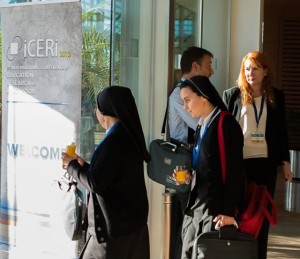 A couple of weeks ago I had the privilege to attend, present and chair at the International Conference of Education, Research and Innovation (ICERI) in Seville, Spain (18-20 November 2013). This came about due to the comprehensive research completed by a group of us at school, upon the request of our principal, into ‘ICT and Active Learning’. The investigation involved visiting a variety of innovative schools, surveying our own community and secondary research. The report ended up being 60 pages long and has resulted in the implementation of REAL (Relevant, Engaging, Active Learning), a concentrated effort for a paradigm shift to more student-centred learning in a Year 7 pilot program for 2014. Since we had already completed the research we wrote a couple of different abstracts to apply to present at international conferences and were surprised to be accepted by both. The school is paying for the Innovative Learning Team (ILT) to attend the International Conference on Learning in New York, July 2014, so couldn’t send us to the ICERI one too. I therefore asked for leave and attended under my own steam (except for accommodation). I also gained permission to add a couple of days in Paris to visit my 16 year old daughter on school exchange there. From lift-off to landing I was gone for a total of 9 days, only absent (in body) from school for 5 of them.
A couple of weeks ago I had the privilege to attend, present and chair at the International Conference of Education, Research and Innovation (ICERI) in Seville, Spain (18-20 November 2013). This came about due to the comprehensive research completed by a group of us at school, upon the request of our principal, into ‘ICT and Active Learning’. The investigation involved visiting a variety of innovative schools, surveying our own community and secondary research. The report ended up being 60 pages long and has resulted in the implementation of REAL (Relevant, Engaging, Active Learning), a concentrated effort for a paradigm shift to more student-centred learning in a Year 7 pilot program for 2014. Since we had already completed the research we wrote a couple of different abstracts to apply to present at international conferences and were surprised to be accepted by both. The school is paying for the Innovative Learning Team (ILT) to attend the International Conference on Learning in New York, July 2014, so couldn’t send us to the ICERI one too. I therefore asked for leave and attended under my own steam (except for accommodation). I also gained permission to add a couple of days in Paris to visit my 16 year old daughter on school exchange there. From lift-off to landing I was gone for a total of 9 days, only absent (in body) from school for 5 of them.
So why would I go to so much expense, effort and jet lag to be at ICERI 2013? Put simply, the experience.
For the first time I’ve had an academic conference paper published (with my two colleagues, Melissa Carson and Nick Cook). Although it’s not the level of a peer-reviewed journal, it’s still something. It had to be submitted back in October; I wrote it during the school holidays, heavily based on our report for the principal.
For the first time I’ve presented at an international conference. I was the first to present during my session, forgot to mention a couple of key points, but generally thought it went well. We were asked to use either Adobe Acrobat (pdf) or PowerPoint for our presentations. I was quite pleased with my slides, prepared the day before I left and I wrote what I said during the flight over. I was asked which I thought should come first, the pedagogy or the technology, and I replied quite definitely, the pedagogy, but what I’ve read since has made me question my decisiveness a little.
For the first time ever (beyond the classroom) I’ve chaired a session of presentations. This meant I had to introduce each of the presenters with a supplied biography, pronounce their names as correctly as I could, and ensure they adhered to the tight time regulations. The duo that followed me were speaking for a couple of minutes before I remembered I had to time them but I recovered and nobody knew. The next presenter was so nervous that I concentrated too much on calming and preparing her that I forgot to introduce her. She ran out of time so I concluded with a comment about how fast the time slips away when up front that I also forgot to introduce her and did it then, at the end of her talk. From then on I was much better and even managed to gain a laugh with my comments about the last speaker’s presentation.
Of course there is the added benefit of the credibility it provides to me and my school.
Unlike the various school conferences I’ve attended, this conference was wholly based on academic research. Each presentation went for 15 minutes and I attended approximately 50 of them on a wide range of topics. Some were highly technical analysis of statistics that bored me but then I was often surprised by the interest some audience members displayed in the following Q&A. Most presentations had something that fascinated me.
By theme the sessions I attended were:
- In-service training and professional development of teachers
- Accreditation and quality assurance: evaluation and assessment
- Learning space design
- Assessment of student learning
- Educational trends and best practice contributions
- Global, social and legal issues in education
- Experiences and strategies for curriculum design
- Teachers’ perception of ICT (my session)
The highlights for me were Morten Fahlvik (@Fahlvik) speaking about blended learning, Ruth Bridgstock (@RuthBridgstock) speaking about educating for digital futures, Alex Tyman presenting on perceptions of leadership and the presenters in my session who had researched teachers’ responses to the introduction of or increase in ICT usage in classrooms.
Some of the issues that had me thinking include:
- technology increasing the income gap and the lack of ICT adding to the poverty cycle
- pedagogy being taken hostage by the tools
- ‘massification’ resulting in the requirement of large halls; personalisation resulting in the requirement of smaller learning spaces; and ‘interactive classes’ requiring convertible settings
- parallels between digital media professionals and teachers networking through PLNs on Twitter and TeachMeets
- how we keep judging leaders against our prototypes (men, tall, suits, aggressive, etc) instead of what we say leadership should be about (consultative, caring, diplomatic, etc)
- a study of US songs have had a recent exponential rise in use of the words ‘me’, ‘myself’ and ‘I’ in lyrics
- how students condemn cheating but justify their own cheating but also how this has been researched with many underlying assumptions (eg what actually constitutes ‘cheating’)
- how to assess social and ethical behaviour/attitudes
- the language used in relation to shifting teaching styles should not be “make them”
- focusing more on students’ competencies than knowledge

Photo from http://iated.org/iceri2013/pictures
The other important aspect of the conference was simply talking with other earnest educators, the vast majority being from universities around the world.
Before the conference, I had already connected with @davidwebster (David Webster – University of Gloucestershire) via Twitter through the hash-tag #iceri2013 and found each other in person during the first break.
At the first day’s lunch I sat next to Tony Scafide of SUNY Oneonta (USA) and we talked intensely all lunch and throughout the cocktail party the following night about life, the universe and everything.
On the second day I lunched with Ruth Bridgstock (QUT) and Margaret Mackay (University of Portsmouth) and we discussed how people learn and how to motivate students and teachers to want to learn (without finding definitive answers).
It was truly an international conference. In my session alone the presenters were from Norway, Nigeria, Israel, Poland and Turkey. But I must say, for a conference about innovation in learning, Twitter was rather quiet.
Overall, despite the rotten cold I had the entire time I was away (and still), it was the conversations with intelligent and passionate people in education that will stay with me the longest. It motivates me to continue with my study, my teaching and my interest in student-centred learning. Somebody described me as a border collie, meaning I’m the one who rounds everyone up, gathering them in to try and face them in the right direction. I think that is a pretty good summary and a conference like this will keep the wag in my tail a little bit longer.
